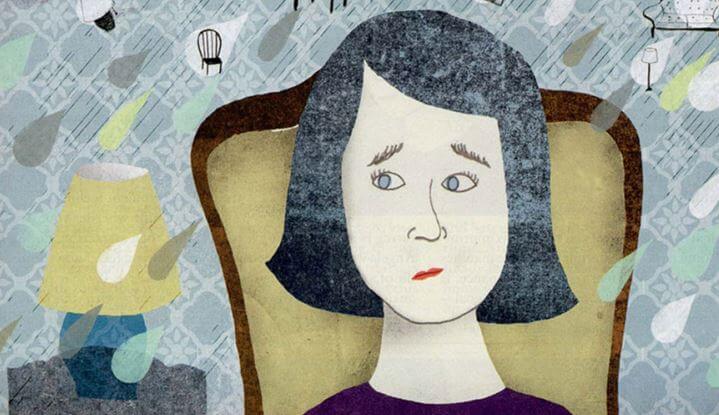Stress: Wanting to Be "There" While You're "Here"

We could define stress as the cognitive, emotional and behavioral state that generates the longing or desire to be “there” while you are “here.” It turns negative when it escapes our control and turns the collection of thoughts, management of tasks and optimization of our resources into agony.
Work, social, family and personal pressures force us to continuously readjust our expectations and actions. We can’t allow ourselves to lose our job, we have to pay debts, take care of 20 pending tasks, maintain emotional dedication to our romantic partner, study for those exams, etc.
One day, overwhelmed by all of these obligations, we realize that we have trouble falling sleep. That we’re up at three in the morning, laying in bed, thinking about how we’re ever going to make ends meet this month.

The hours pass as we become more and more anxious over the fact that we can’t seem to fall asleep, and we need to rest up for the following day. Finally, a light and not very rejuvenating slumber overpowers us, and we awaken the next day even more tired and in a worse mood.
This situation repeats itself every night, making the exhaustion build up, generating powerful headaches that slowly become more and more frequent. These give us an unpleasant feeling of mental dullness and emotional and physical numbness.
It’s likely that our pulse will increase. Also, our breathing will become labored at times. Other times we will find ourselves attempting to take deep breaths in order to manage our state of alertness.

The punishment of stress
When stressful factors are psychological and social, our body activates certain physiological responses that allow us to “keep up the rhythm” for a while and worry about the things that may bring about negative consequences (for example, working in order to not run out of economic support).
However, these physiological responses are not adaptive “long-term.” In fact, if sustained over time, their effects can include decrease in sexual arousal, menstrual problems, and a diminished immune system, etc.
Although the subject is much more complex, we could see as a “stressor” anything that breaks down our inner balance and forces the hypothalamus adrenal axis into overdrive in an attempt to guarantee our psychological and physical well-being.

A body under stress, a system attempting to handle threats
Robert M. Salpolsky wrote in his highly recommended book, Why Zebras Don’t get Ulcers: “in our privileged life, we have been the only ones in the animal world with enough intelligence to invent certain stressful agents for ourselves and the only ones stupid enough to allow these to dominate our lives.”
Stress is the result of the differences perceived between environmental demands and the tools available to us to address them. Therefore, having tools that allow is to regain our balance on a daily basis is a good strategy to put into practice an appropriate response.
How we react to stress and how we manage this will depend in great measure on the convergence of various personal and social variables.

The dear reader surely already knows that magic cure-all formulas don’t exist. Nevertheless, we can name some of these strategies and techniques, which we can learn with the help of a professional and guided self-help books.
Thus, to name a few self-help books aimed at anxiety and stress issues:
- Some of the books by Albert Ellis: You Can Be Happy and How to Control Anxiety Before it Controls You.
- Goodbye Anxiety by David Burns.
- Stress. New Techniques to Control It by Francisco Javier Labrador Encinas.
It’s useful and enriching in order to cope with anxiety and stress that we learn more about techniques based on breathing, “stopping” thinking, relaxation, coping, etc. Mindfulness is a good way to learn how to focus on the here and now.
The list of recommendations can be as endless as the list of concrete cases of stress and anxiety. That’s why it’s important that we search exhaustively for the most useful strategies for us to handle stressful situations, which make such a dent in our overall health.
We could define stress as the cognitive, emotional and behavioral state that generates the longing or desire to be “there” while you are “here.” It turns negative when it escapes our control and turns the collection of thoughts, management of tasks and optimization of our resources into agony.
Work, social, family and personal pressures force us to continuously readjust our expectations and actions. We can’t allow ourselves to lose our job, we have to pay debts, take care of 20 pending tasks, maintain emotional dedication to our romantic partner, study for those exams, etc.
One day, overwhelmed by all of these obligations, we realize that we have trouble falling sleep. That we’re up at three in the morning, laying in bed, thinking about how we’re ever going to make ends meet this month.

The hours pass as we become more and more anxious over the fact that we can’t seem to fall asleep, and we need to rest up for the following day. Finally, a light and not very rejuvenating slumber overpowers us, and we awaken the next day even more tired and in a worse mood.
This situation repeats itself every night, making the exhaustion build up, generating powerful headaches that slowly become more and more frequent. These give us an unpleasant feeling of mental dullness and emotional and physical numbness.
It’s likely that our pulse will increase. Also, our breathing will become labored at times. Other times we will find ourselves attempting to take deep breaths in order to manage our state of alertness.

The punishment of stress
When stressful factors are psychological and social, our body activates certain physiological responses that allow us to “keep up the rhythm” for a while and worry about the things that may bring about negative consequences (for example, working in order to not run out of economic support).
However, these physiological responses are not adaptive “long-term.” In fact, if sustained over time, their effects can include decrease in sexual arousal, menstrual problems, and a diminished immune system, etc.
Although the subject is much more complex, we could see as a “stressor” anything that breaks down our inner balance and forces the hypothalamus adrenal axis into overdrive in an attempt to guarantee our psychological and physical well-being.

A body under stress, a system attempting to handle threats
Robert M. Salpolsky wrote in his highly recommended book, Why Zebras Don’t get Ulcers: “in our privileged life, we have been the only ones in the animal world with enough intelligence to invent certain stressful agents for ourselves and the only ones stupid enough to allow these to dominate our lives.”
Stress is the result of the differences perceived between environmental demands and the tools available to us to address them. Therefore, having tools that allow is to regain our balance on a daily basis is a good strategy to put into practice an appropriate response.
How we react to stress and how we manage this will depend in great measure on the convergence of various personal and social variables.

The dear reader surely already knows that magic cure-all formulas don’t exist. Nevertheless, we can name some of these strategies and techniques, which we can learn with the help of a professional and guided self-help books.
Thus, to name a few self-help books aimed at anxiety and stress issues:
- Some of the books by Albert Ellis: You Can Be Happy and How to Control Anxiety Before it Controls You.
- Goodbye Anxiety by David Burns.
- Stress. New Techniques to Control It by Francisco Javier Labrador Encinas.
It’s useful and enriching in order to cope with anxiety and stress that we learn more about techniques based on breathing, “stopping” thinking, relaxation, coping, etc. Mindfulness is a good way to learn how to focus on the here and now.
The list of recommendations can be as endless as the list of concrete cases of stress and anxiety. That’s why it’s important that we search exhaustively for the most useful strategies for us to handle stressful situations, which make such a dent in our overall health.
This text is provided for informational purposes only and does not replace consultation with a professional. If in doubt, consult your specialist.







